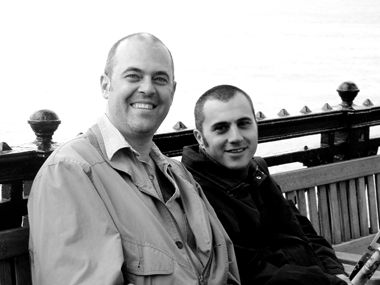By Johanna Petersson
Gay activists in the United States often view Europe as a gay safe haven. But there are great differences in the level of protection for the lesbian, gay, bisexual and transgender communities, especially when it comes to the issue of marriage. Still, as President Bush pushes for a constitutional amendment outlawing marriage for gays and lesbians, the pro-gay stance of Europe is quite unique.
Marc Behrendt and Beso Khutishvili live in South London in the United Kingdom, a new environment for them and far away from family and friends. They met three years ago while Marc Behrendt, an American citizen, worked for an international organization in the former Republic of Georgia. They both enjoyed life there, but in the traditional and religious Orthodox Georgian society, homosexuality is a considerable social stigma and remains very much closeted. As their relationship developed, the resistance from Khutishvili’ s Georgian family increased, and finally the couple saw no other solution but for Behrendt to seek work in Europe, in order to be able to live together.
“We are not in the U.S. because I could not bring my family, Beso, there,” Behrendt said. “I was forced to leave the U.S. Here in Europe, we have protection. I received a work permit in the U.K. and Beso is credited as my partner and also received a work permit.”
Behrendt now works for International Alert, an nongovernmental organization working on conflict resolution and democratization issues in the Caucasus and Central Asia, while Khutishvili is studying English. Behrendt enjoys his work, which he finds both challenging and complex, but in the long run he would like to live close to his family and friends in the U.S. — something that is impossible right now.
Behrendt and Khutishvili are enjoying the benefits of the United Kingdom immigration laws that — unlike those in the States — recognize same-sex relationships as equal to heterosexual relationships when applying for visas. Gay and co-habiting couples in Britain also have the same property, pension and “next-of-kin” rights that married couples enjoy. When it comes to marriage, only the Netherlands and Belgium recognize marriage for gays and lesbians. Belgium even amended its marriage law to include noncitizen gay couples if they can prove they are not allowed to marry in their home country. In Spain, the socialist government has drafted a bill that not only allows for gay and lesbians to marry but also to adopt Spanish children. The law is expected to be approved by the end of June.
In the U.S., many states have moved in a different direction. Fourteen states have made constitutional amendments outlawing same sex marriages. Massachusetts is the only state that gives marriage licenses to same-sex couples, while Vermont and Connecticut have civil-union laws that give statewide spousal rights to same-sex couples. New York, New Jersey, Rhode Island, New Mexico and the District of Columbia do not have laws prohibiting same-sex unions. In New York, Mayor Michael Bloomberg has challenged a ruling by a State Supreme Court judge that found that gay couples must be allowed to marry. While expressing that he was pro-gay marriage, Bloomberg said he wanted to avoid the same confusion that took place in California, where gay marriages were later annulled. If the Court of Appeals, the state’s highest court, votes against same-sex marriage, Bloomberg said he would ask to have the legislation changed. The New York case is currently in the Appellate Court, the state’s second-highest court, and arguments are expected in the fall. There are currently three cases ongoing working their way up to the highest court.
Fourteen countries in Europe offer some sort of legal protection to same-sex couples; Denmark, Finland, Norway, Croatia, Germany, Switzerland, Sweden, Luxembourg, Scotland, France, Iceland, Portugal, Britain and Hungary, while new European Union member countries Poland and Slovenia are preparing laws on registering partnerships.
The European Region of the International Gay and Lesbian Association, a gay rights organization, welcomes all moves towards equal rights. “We support any level of recognition which moves to improve rights for the L.G.B.T. community — in whatever shape they may take,” said Juris Lavrikos, the organization’s spokesperson. “What we care about is the substance of the law; it is not a matter of wording.” Even if Lavrikos thinks matters are moving in the right direction, he challenges the view of Europe as a gay safe haven, since, just as in the U.S., there is a great difference in the experience of same sex-couples depending whether they live in a small rural village or a capitol city, he said. “All countries have issues, on different levels,” Lavrikos said. “For example, in the Netherlands, a developed gay rights country, we are now receiving reports of increased levels of gay bashing.”
The Polish parliament is currently working on a law registering partnerships, but a couple of weeks ago Warsaw’s mayor banned the gay pride parade there for the second year running, claiming its application had not been filed properly. Twenty-five hundred people defied both the ban and anti-gay protestors throwing eggs.





































